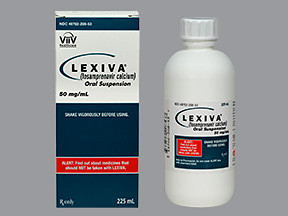FOSAMPRENAVIR - ORAL
PHONETIC PRONUNCIATION: (fos-am-PREN-uh-veer)
COMMON BRAND NAME(S): Lexiva
GENERIC NAME(S): fosamprenavir calcium
Uses
USES: This drug is used with other HIV medications to help control HIV infection. It helps to decrease the amount of HIV in your body so your immune system can work better. This lowers your chance of getting HIV complications (such as new infections, cancer) and improves your quality of life. Fosamprenavir belongs to a class of drugs known as protease inhibitors. It may be given with ritonavir, another protease inhibitor, to increase ("boost") the levels of fosamprenavir. This helps fosamprenavir work better. Fosamprenavir is not a cure for HIV infection. To decrease your risk of spreading HIV disease to others, do all of the following: (1) continue to take all HIV medications exactly as prescribed by your doctor, (2) always use an effective barrier method (latex or polyurethane condoms/dental dams) during all sexual activity, and (3) do not share personal items (such as needles/syringes, toothbrushes, and razors) that may have contacted blood or other body fluids. Consult your doctor or pharmacist for more details.
How to use FOSAMPRENAVIR - ORAL
HOW TO USE: Read the Patient Information Leaflet if available from your pharmacist before you start taking fosamprenavir and each time you get a refill. If you have any questions, ask your doctor or pharmacist. Take this medication by mouth as directed by your doctor, usually once or twice daily. Fosamprenavir tablets may be taken with or without food. If you are taking fosamprenavir suspension, shake the bottle well before each dose. Carefully measure the dose using a special measuring device/spoon. Do not use a household spoon because you may not get the correct dose. Adults should take the suspension without food. Children should take the suspension with food. If vomiting occurs less than 30 minutes after taking a dose, repeat the dose. The dosage is based on your medical condition, response to treatment, other medications you may be taking, and if you have taken protease inhibitors to treat HIV before. For children, the dosage is also based on age and weight. Be sure to tell your doctor and pharmacist about all the products you use (including prescription drugs, nonprescription drugs, and herbal products). If you are directed to take ritonavir with this medication, take them both at the same time(s). For the best effect, take this medication at evenly spaced times. To help you remember, take this medication at the same time(s) every day. It is very important to continue taking this medication (and other HIV medications) exactly as prescribed by your doctor. Do not skip any doses. Do not take more or less of this drug than prescribed or stop taking it (or other HIV medicines) even for a short time unless directed to do so by your doctor. Doing so may cause the amount of virus to increase, make the infection more difficult to treat (resistant), or worsen side effects.
Side Effects
Precautions
Interactions
Overdose
Images
Reviews
Faq for FOSAMPRENAVIR - ORAL
- Fosamprenavir is an oral medication used for the treatment of human immunodeficiency virus (HIV) infection. It is specifically used in combination with other antiretroviral drugs to control HIV and slow down the progression of the disease.
- Fosamprenavir belongs to a class of drugs known as protease inhibitors. It works by blocking the activity of the HIV protease enzyme, which is essential for the replication of the virus. By inhibiting this enzyme, Fosamprenavir prevents the virus from reproducing and spreading in the body.
- The recommended dosage of Fosamprenavir depends on various factors such as a patient's age, weight, and the presence of any other medical conditions. It is usually taken twice daily with food. It is important to follow the prescribed dosage and instructions from your healthcare provider.
- Yes, some common side effects of Fosamprenavir may include headache, nausea, diarrhea, abdominal pain, fatigue, and rash. These side effects are usually mild and temporary. However, if they persist or worsen, it is important to inform your doctor.
- Yes, Fosamprenavir can interact with several medications, including other antiretroviral drugs, antibiotics, antifungal medications, cholesterol-lowering drugs, and certain medications used to treat seizures or mental disorders. It is crucial to inform your healthcare provider about all the medications you are currently taking to avoid any potential drug interactions.
- Fosamprenavir should only be used during pregnancy if clearly needed and under the supervision of a healthcare provider. It is important to discuss the potential risks and benefits with your doctor before starting or continuing this medication during pregnancy.
- Fosamprenavir should be stored at room temperature, away from moisture and heat. It should be kept in its original container with the lid tightly closed. Do not store it in the bathroom. Keep it out of the reach of children or pets.
- If you miss a dose, take it as soon as you remember. However, if it is already close to the time for your next dose, skip the missed dose and continue with your regular dosing schedule. Do not double the dose to make up for a missed one.
- No, Fosamprenavir cannot cure HIV, but it can help control the virus and improve the immune system. It is important to take Fosamprenavir as prescribed and continue to follow a comprehensive treatment plan recommended by your healthcare provider to manage HIV effectively.
Disclaimer
IMPORTANT: HOW TO USE THIS INFORMATION: This is a summary and does NOT have all possible information about this product. This information does not assure that this product is safe, effective, or appropriate for you. This information is not individual medical advice and does not substitute for the advice of your health care professional. Always ask your health care professional for complete information about this product and your specific health needs.



No Reviews Yet